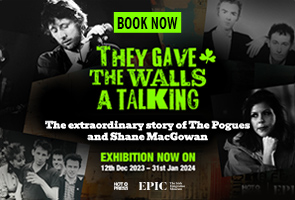Living and writing the twentieth century
Published in 20th-century / Contemporary History, Features, Features, Issue 2 (Summer 2004), Volume 12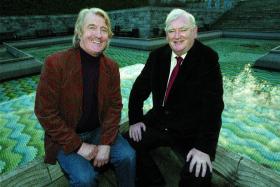 BB: Tell us something about your background and about the people who influenced you most in your formative years.
BB: Tell us something about your background and about the people who influenced you most in your formative years.
TPC: I grew up in impoverished middle-class surroundings in Monkstown, Co. Dublin. My father was a Sinn Féin activist with W.T. Cosgrave, Kevin O’Higgins and Michael Collins, setting up the local government and court system that hollowed out the British administration. He was the first deputy commissioner of the Civic Guards and went on to became a barrister and a Fine Gael TD. He became secretary of the party and, but for his untimely death, might have been minister for justice in the first inter-party government of 1948. My mother was a former Abbey actress, a beauty queen and a newspaper columnist with the Evening Herald. I suppose it was from her that journalism entered the blood. She was a remarkable woman who wrote a famous novel, The Big Wind. Both my father and mother were very good readers and there were a lot of books both in our house and in my father’s home place in Castlecomer, Co. Kilkenny. I remember reading in the summer holidays the complete works of Pearse and a collection of the lives of characters that you wouldn’t find in mainstream Irish history teaching, like Cahir O’Doherty and Galloping Hogan. The Coogans had a bit of land and a pub and would have had a lot more but for my grandfather’s thirst. There was a strong nationalist tradition in the family going back to ’98, reinforced by the Black and Tans when they beat up my grandfather.
But just to demonstrate the complexity of the Irish situation my maternal grandfather, Patrick Toal, was an RIC sergeant. By the time of the Anglo-Irish war, in addition to his police duties, he had acquired a post office and pound, at Hazelhatch, Co. Kildare, an important halting site for cattle en route to and from the Dublin market. Despite being on good terms with the local IRA, one day a column came calling, looking for the proceeds of the post office. My maternal grandmother—a very striking, beautiful woman, who never stinted on the use of the English language when her temper was up—castigated the column leader, saying that ‘the miserable bastard would not have dared show up if my two fine sons, Tim and Frank, weren’t away in Genoa studying for the priesthood’. At this he ordered his men to set fire to the place.
My uncles, Tim and Frank, were duly ordained and they paid for my education after my father died when I was twelve. I was a pretty unruly student; I couldn’t pass an exam if I set it myself and consequently went to a litany of schools—the Christian Brothers in Dún Laoghaire (overall they were very pleasant to me, until I met the inevitable sadist), Belvedere (which I hated), Xavier’s in Donnybrook (a very pretentious lay-run place, full of the children of my father’s contemporaries—Costelloes, McGilligans, McBrides—many of whose fathers became cabinet ministers in 1948), and finally Blackrock (where I had very good teachers). My history teacher, Fr Michael Carroll (‘Doc’, as we called him), had a teaching style that was as vivid as it was learned, and I also remember my English teacher, Fr ‘Vicki’ Farragher, with affection. But it was the Doc who had the greatest impact on my life. Without telling me, he recommended me to Vivion de Valera, phoning him to say that he had a boy in his class who would either turn out a genius or break his heart. I did neither but I got a start on the Evening Press which was founded that year, 1954. So I went straight from Blackrock into journalism, after barely a couple of weeks’ holidays.
BB: When you joined the Evening Press did you anticipate difficulties with the de Valeras?
TPC: No I didn’t. It was Vivion de Valera who was at the Press, and he was a friend of my father and I always felt close to him. Vivion, my father, Seán McBride and Vincent Grogan, who later became the Chief Knight of Columbanus, all studied at the bar together. Dev senior was a different matter. My father thought that Dev had done terrible harm to the country, that the Civil War was unnecessary, and that the Treaty should have been worked. Later, as I grew up, I came to share his view. But remember, I started in the Evening Press, not the Irish Press, which was a very different publication; it steered clear of politics and had a different, younger staff. We regarded the Irish Press as sort of neanderthal. It didn’t move with the times, and as de Valera senior grew old he was incapable of either loving or leaving power. No philosophy evolved: he was the editor-in-chief as well as being the controlling director and the managing director; he was the three divine persons in one, incorporated into the articles of association. Yet it was quite pleasant at the Evening Press, I had a great time there, and Douglas Gageby was a great editor. By 1968 I was married with children, so when Vivion de Valera approached me to become editor of the Irish Press it was an offer I could not turn down.
BB: So why, then, did you divert your energies into history?
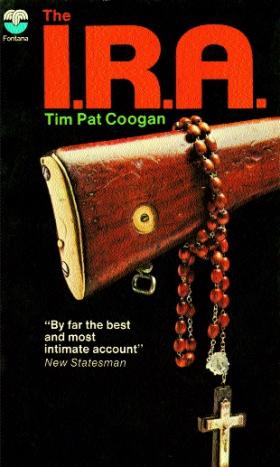
‘That book was quite slim when it came out. Now it’s thicker than War and peace, and I very much hope the war does not return to supersede the peace, and that there will be no more editions.’
TPC: I always had a general impulse to write. I had a lot of energy and the job didn’t fully occupy it. Then the late F.X. Martin was approached by an English publisher, Pall Mall, who wanted a history of Ireland to mark the fiftieth anniversary of the 1916 Rising, the first fifty years, and F.X. recommended me. When it appeared in 1966 Ireland since the Rising was quite a success. It seems incredible today, but it was the first history to tell that generation what had happened since 1916, which because of Civil War sensitivities, Hazelhatch-like activities, was where contemporary Irish history teaching, and writing, usually stopped. Being a pioneering work it made a lot of waves, and the publishers wanted me to write something else. My English agent had been a boy in Coventry in 1939 and couldn’t understand why the IRA had bombed the place. He had always been intrigued by the IRA and suggested that I expand that chapter into a full-scale book. I had very strong views against violence and yet many of the IRA men I had interviewed for Ireland since the Rising seemed very gentle and rational, and though I did not agree with them I had to concede the sincerity with which they argued their point. Also they were generally deeply religious. These would be Southerners mostly, although I met one or two Northerners as I went along. However, the then IRA chief-of-staff, Cathal Goulding, ordered the movement not to cooperate, and word was sent to me that I wasn’t to proceed. I sent word back that I was going to write it anyway (I was young then!), that it wasn’t his history, that it was our history and that I was going to do it with or without their cooperation. There’s always divisions in the republican movement and it happened that there were people who didn’t agree with the Marxist line of the time and they were very cooperative. When I started writing The IRA in 1966 I was describing an extinct volcano, an interesting phenomenon from the past. By the time it came out in June 1970 we had had the August ’69 pogroms in the North, the split in the IRA and the foundation of the Provisionals and we were in the middle of the Arms Trial. Suddenly it was a live issue that became my predominant interest for many, many years. I became involved in activities like bringing Protestants and Catholics down here to meet and talk and so forth. But it was love’s labour lost because there’s an irreducible minimum quotient in unionism of absolute bigotry and sectarianism. You have to make a distinction between unionism and Protestantism. I was very fond of the late Archbishop Simms (the Church of Ireland archbishop). He told me once that he could nearly do an actuarially-based account of the numbers of his flock he would lose when he attended an ecumenical gathering; he could tell what the headline would be in Paisley’s Protestant Telegraph.
BB: Did you regard your lack of professional training as a historian as in any way an impediment when you turned to history?
TPC: I would regard it as a distinct asset, first because I didn’t acquire the rather lazy approach that many historians had. The lack of output up to very recently by—what Seán McBride used to call—‘Dublin 4 historians’ has been striking: they seem to have done as little as they possibly could. Remember that Ireland since the Rising was the first history of a fifty-year period. That tells you something. The second thing was, and to a degree still is, their very arid approach to history, making it dull, dehydrated. No blood ever was shed, apparently; the Famine was portrayed as the nineteenth-century version of the Scarsdale diet, something that Trevelyan and company always regretted; they never intended this to happen, etc. There has been a lot of talk about ‘professionalism’ and ‘revisionism’ but the phrase that occurs to me is traison des clercs. A lot of them did not revise in the sense of getting new facts or looking with the passage of years and saying, ‘Well, maybe this man was harshly judged by history or overly praised and now it is time to look at the other side’. They tended to fit Irish history into the contemporary political psychological war. They regarded Irish nationalism as an atavistic pursuit of bloody bog men, responsible for today’s bombs, as if it had nothing to do with the apartheid state which the unionists and the British set up and maintained. At the same time Southern governments allowed this to happen and didn’t in any way meaningfully act to do something about nationalists in Northern Ireland. So I found that it was a great help not to be bound by these constraints, not to become a member of that large and ever-growing society known as ‘conference-going man’, ever with an eye to the next seminar or potential sabbatical or few months here or there with a pal over in Oxbridge or Irish America or wherever. There are a few honourable exceptions, for example the former Irish Press sub-editor Dermot Keogh, Joe Lee, yourself, and a few more like Charles Townshend and Alvin Jackson. But for a long time most Irish history was written by Irish-American historians like James Donnelly, Emmett Larkin, Larry McCaffrey and Kerby Miller. They produced far more, and far better, than their Dublin 4 contemporaries.
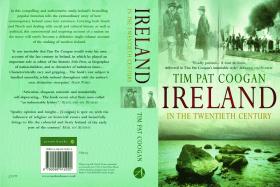 BB: But on the other hand, couldn’t you be accused in turn of a lack of objectivity, for instance in your assessment of de Valera?
BB: But on the other hand, couldn’t you be accused in turn of a lack of objectivity, for instance in your assessment of de Valera?
TPC: I could only be accused of distortion if it was found that I falsified facts and didn’t substantiate everything I said. I think de Valera led the country down very wrong paths. He left three things behind him: the Fianna Fáil party, his constitution and the Irish Press. It is significant which has survived. The Irish Press is dead because he didn’t set it up properly so that it could be run as a proper business in which shareholders would have had a voice and outside managerial expertise brought in. The constitution is forever being tinkered with because it was obviously a ‘Christ and Caesar’ job of its time, with many drafts written by the late John Charles McQuaid. As it stands it would not do for a 32-county Ireland. De Valera’s vision didn’t really encompass that, though he claimed it did. What has survived, despite the appalling scandals surrounding it, is the Fianna Fáil party, the power structure that he bequeathed. That was something de Valera really understood: power—how to get it and to hold it. What to do with it is another matter, but it is no accident that the only book Dev took with him to America in 1920 was The Prince by Machiavelli. Yet some of his letters as a younger man writing to his wife are quite human. He comes across as being quite a nice guy then, but somewhere along the line he decided to put aside the things of childhood and the nice-guy stuff and do whatever was necessary for power. If it meant being arrogant, if it meant denaturing himself and if it meant letting a generation slip into emigration then he would do it and he did it. I feel very bitter; I’m a product of the ’50s and both in my family and amongst my generation I saw terrible damage, people emigrating to dead-end jobs without proper education and falling into alcoholism and so on. Fortunately the Irish are such a vigorous people that enough of us came through to make that a thing of the past (even though at present 20,000 per year are still emigrating), but the ’50s left a mark on me of elderly politicians of both parties hanging on and doing nothing. Lemass was a godsend, and Whitaker; they changed things in a way that cannot be praised enough.
BB: That brings us to your latest book, Ireland in the twentieth century. Why did you write it?
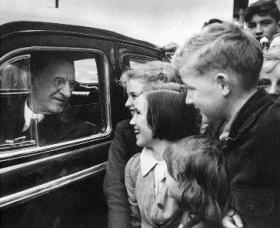
‘I think de Valera led the country down very wrong paths.’ (Hulton Getty Collection)
TPC: I had my own view on the period; it was something I wanted to do, and for the entire century and the whole island. Joe Lee’s monumental book (Ireland 1912–1985: politics and society), for example, only takes the story up to the 1980s when it was written, and doesn’t deal that much with the North. Dermot Keogh’s 20th century Ireland hardly deals with the North at all, for reasons that he explains in his preface. I start with the nineteenth century as a precursor to all that happened and go right up to the Good Friday Agreement. I detail what happened in the North, so that people could understand what the quality of life was there and what the issues were and how it exploded. I think it was a logical thing to do with all the other parts of the jigsaw. I had already covered various figures and periods in the history. My de Valera book took it up to the ’70s and the IRA book was contemporary. Every so many years there would be a new edition. That book was quite slim when it came out. Now it’s thicker than War and peace, and I very much hope the war does not return to supersede the peace, and that there will be no more editions.
BB: Do you think your treatment of the Catholic church in the book is balanced?
TPC: My treatment of the Catholic church is quite affectionate in the earlier stages. The priest was a sympathetic authority figure interposed between the community and a very harsh and ungenerous system. I praise the Christian Brothers for the good things they did, but as the century wore on a great human institution, which existed without real competition, succumbed to the abuse of power. The industrial schools were the black hole of the Irish church, of Irish society generally, because we are all guilty, none of us intervened to stop what went on. We didn’t know, didn’t want to know, and hid behind our respect for the clergy and our respect for authority and the kind of general Irish shrinking from the taboos of sex. I got angry at the attitude of the church in passing the parcel. Paedophile offenders in positions of power and respect were quietly transferred from one parish or one school to another where they could continue their activities. And these people were telling us from the pulpit how to live! I found that offensive.
I have a problem with how authority is exercised by the church, the way bishops are appointed with no concern for the wishes of the clergy or the congregation. The people are graciously conceded 100 per cent responsibility for their upkeep, graciously enjoined to have 100 per cent respect for their authority and have zero input into their selection! I also think clerical celibacy has more than had its day and I would like to see both married priests and women priests. Yet I have a great affection for the kindness and the scholarship one can come across in the church and for individual priests and nuns that I’ve met and sometimes worked with, for example Fr Alec Reid, the Peace Process priest, or Doc Carroll, or my two uncles. I have no personal anti-clericalism. Nor do I have any respect for this golden calf society which has evolved, with patients on hospital trolleys, people on waiting lists dying of cancer, while millionaires are up before tribunals making more millionaires of lawyers, defending the indefensible, like selling off the nation’s assets and ripping us off. I find that damnable, a perversion of everything that is good about this country, and it certainly wasn’t what the men of 1916 and my father’s generation, nor indeed I, ever wanted to see. I think it is a disgrace.
BB: In the last sentence of the book you speak about the two colonialisms that have oppressed Irish society: Mother England and Mother Church. You say we have rid ourselves of the former but the task of ridding ourselves of the latter remains. Are you envisaging the evolution of a purely secular society?
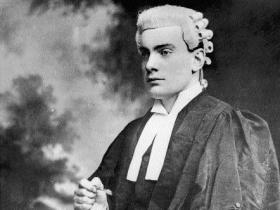
‘Pearse deserves some credit that he isn’t given . . . he did shine a light on Irish culture. And he had a prophetic gift.’ (George Morrison)
TPC: No, I don’t see that. I think it was well expressed by Sr Stanislaus in an interview she did for another book of mine, Disillusioned decades. She likened the institution of the church to a seed that would have to die before it bloomed again, the church of pomp and authority, and its very fetid attitude to sexual morality. In today’s world the teachings on contraception are ludicrous, they are actually damaging in the Third World with the AIDS epidemic. It evoked the same feelings of anger I had at it here with seeing so many unsuitable people being forced to take the boat, parents who hadn’t the psychological or economic resources to rear two children, never mind ten, who were having these huge families and having a terrible life as a result, with the kids growing up in all sorts of ghastly perverted ways, with mental problems and drink problems, and even the paedophilia and incest that we talk so much about today but turned our eyes from for decades. Yet the respect and affection for a good priest in Ireland is what it always was, even though some priests—sensitive, decent men—have to put up with the taunt of child abuse when they are in the street because of what has happened, and that’s a damnable thing too. There is nothing secret or sacred nowadays, everything hangs out, and it is a question of how good men and women adjust to that. But for the church it is no longer a question of a foreign-directed multinational corporation sited in Rome telling people in other countries how to live.
BB: Who do you regard as the most considerable public figure of twentieth-century Ireland and why?
TPC: Larkin, Connolly, Collins obviously, Lemass, Whitaker. Michael Davitt was still around in the twentieth century and had a very benign effect on it. Through the Land League, a very constructive force, he did far more than a lot of other people did for Ireland. Pearse deserves some credit that he isn’t given. I think it is no accident that the revisionists focus on him and make him out to be a bloodthirsty monster who wanted to see the country drenched in the red wine of the battlefield, because he did shine light on Irish culture. And he had a prophetic gift. Looking at the six counties over the past four decades I often found myself thinking of his warning that the people would take what they were not given: ‘Beware the wrath of the risen people’. Today’s northern nationalists are indeed a risen people. Yeats too had a great impact, not alone in what he wrote but in his Abbey Theatre, the way he combined administration with the poetic vision. The Celtic Dawn coterie were admirable people and Field Day in our own time have tried to recreate that. Seamus Heaney, Tom Paulin, Seamus Deane and the rest, they deserve some credit.
BB: If you really had to choose, could you pick out one of those?
TPC: They were all men for their time. For example, Collins might have been the man for a war situation, but would he have been a man for peacetime? Yeats wasn’t a very pleasant fellow personally but a wonderful poet. It might well be Davitt or Pearse. But great men are a bit like mountains, they look better in the distance. Perhaps they should be left that way: inaccessible.
Brendan Bradshaw was until recently Director of Studies in History at Queens’ College, Cambridge.













